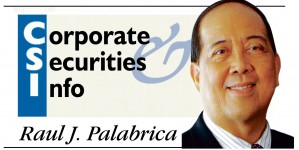Effects of CA freeze order

The order covers 242 bank accounts, securities and insurance policies of Vice President Jejomar Binay, his family, and people and companies that are suspected to be his dummies.
With less than a year to go before the 2016 elections and Binay a shoo-in as the opposition’s candidate for president, the order has drawn political color.
Binay claims AMLC’s action is part of the strategy of the Liberal Party (LP) to derail his electoral ambition and boost the political stock of its presumptive presidential candidate, Interior and Local Governments Secretary Mar Roxas.
The LP leaders denied the accusation and said the order was based on a petition filed by government officials who acted professionally based on their own independent findings.
The total value of the accounts ordered frozen (or cannot be touched without prior court permission) is approximately P11 billion.
Considering the porous state of confidentiality in our country, it is likely that, ahead of the issuance of the order, word about it had already leaked to the affected parties.
Bank deposits
It is difficult to enforce secrecy discipline in an activity that required the participation of the staff of three government offices—AMLC, Office of the Solicitor General and Court of Appeals—and several banks, financial institutions, securities brokers and insurance companies.
“For your eyes and ears only” information does not mean much in our rumor- and gossip-oriented society.
It should not come as a surprise that by the time the freeze order is served on the accounts concerned, the bulk of the bank deposits have been withdrawn, the securities liquidated, and the insurance policies pre-terminated.
Consider what happened when the freeze orders issued by the Sandiganbayan on the bank accounts of former Chief Justice Renato Corona and Senators Jinggoy Estrada and Bong Revilla were enforced.
The bank accounts of Corona that were believed to contain P130 million in unexplained wealth showed only P2,770.13.
The measly sum of P70,000 was the remaining balance of the P183.7 million in pork barrel funds allegedly deposited in Estrada’s bank accounts.
In Revilla’s case, only P290,000 were left out of the P224.5 million in pork barrel funds he was suspected to have stashed in his bank accounts.
Impression
For Binay and his family, the effects of the freeze order are more political than financial.
Our politicians know better than keep all their money in the banks and observe business hours in making withdrawals from their accounts. They have money caches within reach for spur-of-the-moment expenses and other financial exigencies.
The freeze order creates the impression that Binay and his family, with the assistance and cooperation of his alleged dummies, are probably guilty of graft and corruption in the construction of Makati Building II.
The presumption of innocence to which Binay is entitled to hardly matters to the uninitiated among our countrymen when they hear of or read about this court order.
The usual reaction of laymen in this case is, if no crime was committed, why were the bank accounts frozen? Perhaps, there is truth to the charges of overpricing and manipulation of the bidding process.
Binay has to move heaven and earth to have that freeze order lifted immediately; otherwise, the impression of wrongdoing will harden.
If he is unsuccessful or, worse, the court extends it beyond the original six months, he may be forced [for salvation] to invoke the provision of the law which prohibits the freezing of the assets of a candidate for an electoral office during an election period.
Consequences
For the private persons, businessmen and companies whose accounts have been similarly ordered frozen, the order may result in adverse financial and personal consequences.
Due to security concerns, most Filipino families refrain from keeping large sums of money in their households to meet living expenses.
Except for the financial-savvy who keep cash reserves for emergencies, financial planning in most households is on ATM basis, i.e., money is withdrawn from the bank as the need arises.
Once bank accounts are frozen, withdrawals are barred and credit card payments via bank debit prohibited.
Payment arrangements through bank deductions for loans, amortizations and other similar financial transactions will be disallowed. If this happens, the bank depositor concerned could be held liable for interests, penalties and surcharges for unpaid financial obligations.
For businessmen and companies, the freeze order spells serious trouble. It would mean losing access to bank accounts and the possibility of any credit line given based on financial viability being terminated or reduced by the creditor.
If the company has local or foreign loans, the freeze order may be considered an “event of default” that would justify the lender into demanding the immediate payment of the loan or foreclosure of mortgaged properties.
It would be worse in case the company is listed on the stock exchange—spooked by the freeze order and the prospects of business stagnation, the stockholders may scramble to unload their shares.
A rush to the exits by stockholders would be like a bank run. The price of the stocks would plunge and, unless a white knight comes in, could spell the company’s end.
Difficult days lie ahead for the subjects of the freeze order.
For comments, please send your e-mail to “rpalabrica@inquirer.com.ph.”